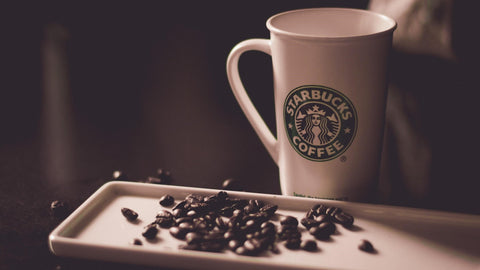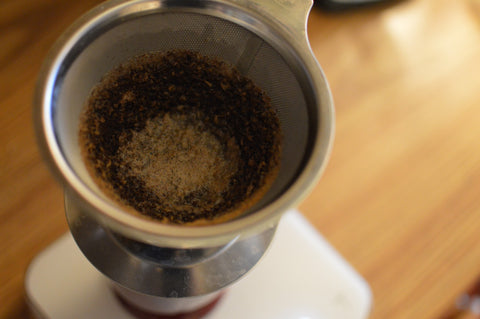Extraction is the most important and least understood aspect of coffee brewing.
It determines everything - the flavor, the body, the acidity, the aroma. Yet, most coffee lovers really have no idea what coffee extraction even means.... and they sacrifice coffee quality because of it.
But you don't want to miss out on rich flavors and aromas if you don't have to - so keep reading to discover:
- What "extraction" is in plain English
- Why small brewing changes have BIG flavor impacts
- How you can harness the power of extraction to improve you coffee
I’ll walk you through it all. By the time you’ve finished reading this article, you’ll know how to have incredible power of your coffee’s flavor.
Read: Have You Tasted These 11 Common Coffee Flavor Defects?
A Brief Primer On How Extraction Works
Coffee brewing is the process of mixing coffee grounds and water so that the water pulls out flavors, acids, oils, and other things from the grounds.
It’s not magic, nor is it incomprehensible science. It’s literally just water sucking things out from the beans. It then dissolves and disperses these things, transforming the water into liquid coffee.
Some things are extracted and dissolved very quickly, like acids and sugars. Other things take a little more time, like oils and solid particles. And a few things, like bitter tannins, take an even longer time to come out.
A balanced extraction is rich with flavors, wonderfully aromatic, crisp with a balanced acidity, and even has a touch of low-noted bitterness to round out the flavor profile.
Over extraction, as you may have picked up, is what happens you extract beyond that sweet spot. It’s the result of extracting too much from the grounds.
It’s important to realize that over extraction isn’t a switch that you flip on and off. It’s a slow, gradual change. It’s possible for coffee to be only slightly over extracted, while another mug can be very much so.
Read: 3 Signs Your Coffee Is Under Extracted
There are some pretty clear signs that your coffee has been over extracted.
Let me show you how to find them.
1. Overpowering Bitterness
Bitterness is a misunderstood realm of flavor.
The best coffees in the world still have a hint of bitterness, usually manifested in the flavors of dark chocolate, spice, or woodiness. These lower notes round out the flavor, balance out the sharper acids, and are generally pleasant in the context of a full mug.
That’s not the kind of bitterness we’re talking about.
We’re talking about in-your-face bitterness. It doesn't add depth or complexity to the other flavors - it overshadows them.
This kind of bitterness is caused by extracting a bunch of bitter chemicals from the grounds. These chemicals, other than caffeine, typically extract after everything else.
Coffees that are roasted very dark tend to have more of these bitter chemicals from the start. So, if you buy beans from an uber-dark roasting company, your coffee could always taste over extracted. Gross. Buy good, expertly roasted beans instead.
2. Dull And Empty Flavor
Over extracted bitterness isn’t just overpowering. Sometimes it can completely kill the other flavors to make your brew seem lifeless, dull, and bland.
Have you ever taken a sip of coffee that you imaged would be delicious, only to find that it was particularly dull and unexciting? As long as your beans weren’t old and stale, it was probably the work of over extraction.
Under extracted coffee can also have a thin, dull flavor, but it’s a different scenario. In that case, an intense sourness will be present because the other balance-encouraging flavors haven’t been pulled out from the grounds yet.
Read: How To Taste Coffee Bitterness
In this case, it’s extra bitterness that’s present, and it’s totally overshadowing the flavors, even though they’re in the cup.
3. Dry Sandpapery Mouthfeel
Have you ever tasted coffee that made your tongue feel dry and scratchy? Have you ever felt like a coffee completely sucked all the moisture from your mouth?
That’s called astringency. It’s the same thing that happens when you drink black tea or dry wine, but, in coffee, it’s a typical sign of over extraction.
This feeling is often caused by polyphenols, micronutrients common in all types of plants. These chemicals taste bitter and bind to your saliva proteins, soaking up your tongue’s natural lubricant and giving it a dry sensation.
Read: How To Taste Coffee Mouthfeel
Sometimes it can be so intense that your tongue feels like sandpaper. Sometimes it can almost feel like something is lightly scratching the back of your tongue as you swallow.
It’s not very pleasant, and it’s a clear example of over extraction.
Common Mistakes That Lead To Over Extracted Coffee
There are many ways to over extract your coffee. Even coffee veterans brew bitter and dull cups from time to time, so don’t feel bad if you do too.
Let’s walk through some of the common brewing mistakes that lead to over extracted coffee.
You brew for too long. Simply brewing for too much time can lead to over extracted coffee. The grounds release their yummy flavors, but if you don’t stop the brewing, they’ll keep releasing those bitter chemicals.
For example, if you brew a french press for six minutes, you may find yourself with over extracted coffee. A fix for next time would be to reduce the brewing time to just four minutes.
Read: Is Hard Water Destroying Your Coffee’s Flavor?
You agitate too much. If you’re brewing with a recipe that involves stirring, shaking, or swirling, it’s possible to over agitate. The more rough you are with your brewing, the quicker the extraction will take place, which makes it really easy to accidentally over extract.
You grind too fine. The finer the coffee grounds, the more quickly the water extracts things from them. This one sort of pairs with brewing for too long, since, the finer you grind, the less time you need.
You use too much water. If you keep pouring water over those grounds and go beyond the golden coffee to water ratios, you’ll quickly have over extracted coffee.
For example, if you’re making a cup of pour over coffee and pour past your target water weight, all the additional water is just pulling out the “extra” stuff that’ll make your brew over extracted. Stick to the golden ratios.
You don’t remove the filter. Ever left your pour over filter sitting over your brew for a few extra minutes? That’s a quick way to kill your cup’s flavor, as water that’s way over extracted slowly drains through the grounds and into your mug.
As a rule, when your pour over dripper appears to be completely drained (but not completely dry, of course), remove the filter.
---
Over extracted coffee is not so yummy, but it’s everywhere.
Escape the bitterness, the dull flavor, and the sandpaper mouthfeel by not falling for these easy brewing mistakes. And, when you do occasionally over extract (no shame - we all do it), know how to tell the signs so that you can fix the problem next time.
However, keep in mind that all this information goes to waste if you’re starting off with over roasted, naturally bitter beans. If you want to gain this skill, and consequently, much better coffee, you need to be brewing with specialty-grade, freshly roasted beans.
Happy brewing!




